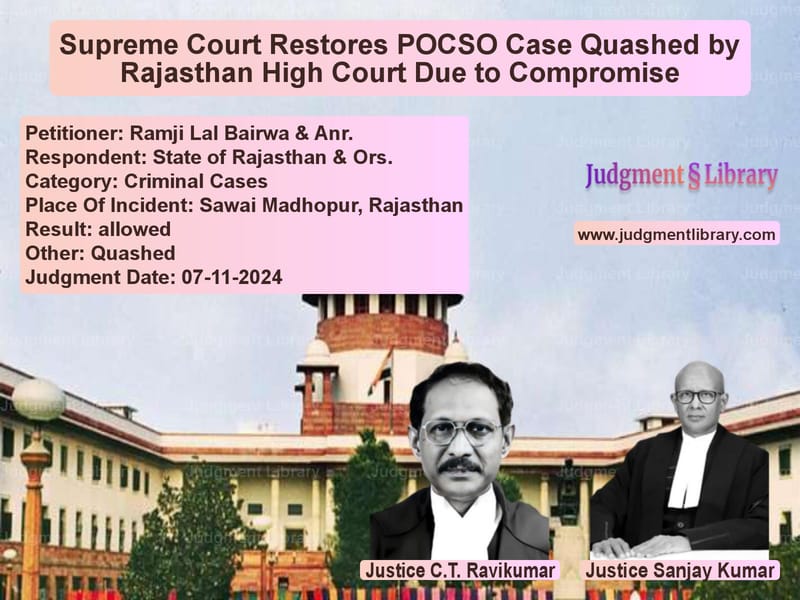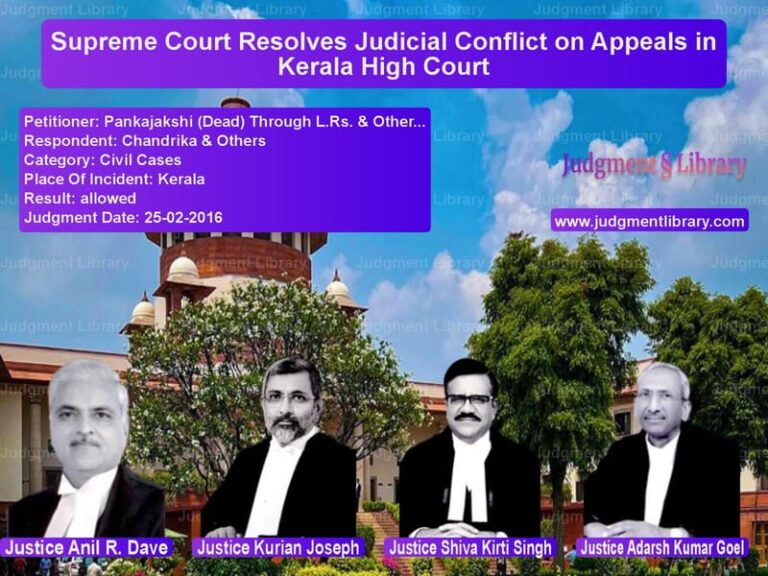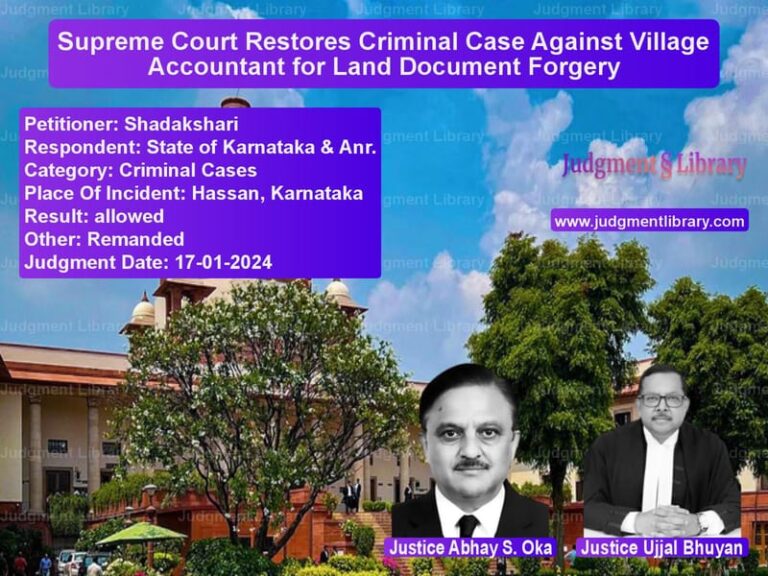Supreme Court Restores POCSO Case Quashed by Rajasthan High Court Due to Compromise
The Supreme Court of India has reinstated the criminal proceedings against a teacher accused of sexual assault under the Protection of Children from Sexual Offences (POCSO) Act, 2012, and the SC/ST (Prevention of Atrocities) Act, 1989. The case, Ramji Lal Bairwa & Anr. v. State of Rajasthan & Ors., addressed whether a compromise between the accused and the victim’s father could justify quashing the FIR and terminating criminal proceedings.
Background of the Case
The case originated from an FIR (No. 6/2022) registered on January 8, 2022, at the Sardar Gangapur City Police Station, District Sawai Madhopur, Rajasthan. The complaint, lodged by the victim’s father, alleged that on January 6, 2022, the accused teacher entered an empty classroom and sexually assaulted his daughter, a Class XI student. The victim ran out of the classroom and sought help from school staff, but they persuaded her to remain silent. The principal later obtained her signature on a blank paper. When the victim’s mother was called to the school, the victim, in a state of shock, was unable to speak. However, upon reaching home, she disclosed the incident to her mother, who then informed her father. The father subsequently filed a police complaint.
The accused teacher was charged under multiple sections of the Indian Penal Code (IPC), the POCSO Act, and the SC/ST Act, including:
- Section 354A (Sexual Harassment)
- Section 342 (Wrongful Confinement)
- Section 509 (Insulting Modesty of a Woman)
- Sections 7 and 8 of the POCSO Act (Sexual Assault of a Child)
- Sections 3(1)(r), 3(1)(s), 3(1)(b), and 3(2)(vii) of the SC/ST Act (Atrocities against a Scheduled Caste individual)
Despite the grave nature of these allegations, the accused reached a settlement with the victim’s father on January 31, 2022, and subsequently filed a petition before the Rajasthan High Court seeking to quash the FIR and ongoing proceedings.
High Court’s Decision
On February 4, 2022, the Rajasthan High Court, relying on Gian Singh v. State of Punjab (2012), quashed the FIR and all related proceedings, reasoning that the case was personal in nature, the dispute had been amicably resolved, and its continuation would be a futile exercise. The High Court observed:
“If it is convinced that the offences are entirely personal in nature and do not affect public peace or tranquillity, and if quashing of such proceedings would secure the ends of justice, the High Court should not hesitate to exercise its inherent powers.”
The High Court also directed the police to file a closure report within one month.
Supreme Court’s Review
Aggrieved by the High Court’s decision, two residents of the same district approached the Supreme Court under Article 32, challenging the quashing of the FIR on the grounds that the case involved serious societal crimes, not merely private disputes. The petitioners argued that:
- The accused had allegedly committed a heinous act of sexual assault against a minor.
- The victim’s family may have been coerced into a settlement, and such agreements should not justify quashing cases under the POCSO Act.
- Sexual crimes against children are offenses against society, and their prosecution should not be left to the discretion of the victim’s family.
- The public prosecutor had opposed the quashing of the FIR, yet the High Court proceeded to dismiss the case without considering the broader implications.
The Supreme Court took cognizance of the matter, appointing senior advocate R. Basant as amicus curiae to assist in adjudication.
Key Observations by the Supreme Court
The Court addressed two fundamental issues:
- Whether a third party had the locus standi to challenge the quashing of an FIR in a serious criminal case.
- Whether an FIR alleging heinous crimes under the POCSO Act and SC/ST Act could be quashed on the basis of a compromise.
On the first issue, the Supreme Court ruled that any concerned citizen has the right to challenge the quashing of an FIR in cases where the accused is charged with serious crimes that impact society. It cited precedents, including PSR Sadhanantham v. Arunachalam (1980), affirming that:
“Crimes are not only committed against individuals but also against society. A concerned citizen has the right to ensure that justice is not subverted by private settlements.”
On the second issue, the Court ruled that:
- Sexual offenses under the POCSO Act are not private disputes and cannot be compromised or settled between the accused and the victim’s family.
- The POCSO Act was enacted to protect children and ensure strict punishment for offenders; quashing cases based on settlements defeats the purpose of the law.
- The High Court failed to consider the seriousness of the crime and the impact of its decision on future cases of child abuse.
The Court noted that:
“The legislature enacted the POCSO Act to address the inadequacy of existing laws. Crimes under this Act must be prosecuted to uphold child rights and ensure justice.”
Final Judgment
The Supreme Court allowed the appeal, setting aside the Rajasthan High Court’s order. It reinstated the FIR and directed the state police to proceed with the investigation and prosecution of the accused. The Court held:
“Quashing FIRs in cases of child sexual abuse on the basis of settlements undermines public confidence in the justice system. Such cases must be pursued rigorously.”
Implications of the Judgment
This ruling has far-reaching consequences:
- Courts must exercise extreme caution before quashing FIRs in serious cases.
- Settlements cannot override statutory provisions in cases involving sexual offenses against minors.
- The decision strengthens the POCSO Act’s role in protecting children from abuse.
- It affirms that third parties can challenge wrongful quashing of cases in the interest of justice.
This judgment sets a precedent against judicial leniency in cases involving sexual crimes against minors and reaffirms the duty of courts to protect vulnerable victims, ensuring that justice is served without being undermined by private settlements.
Petitioner Name: Ramji Lal Bairwa & Anr..Respondent Name: State of Rajasthan & Ors..Judgment By: Justice C.T. Ravikumar, Justice Sanjay Kumar.Place Of Incident: Sawai Madhopur, Rajasthan.Judgment Date: 07-11-2024.
Don’t miss out on the full details! Download the complete judgment in PDF format below and gain valuable insights instantly!
Download Judgment: ramji-lal-bairwa-&-a-vs-state-of-rajasthan-&-supreme-court-of-india-judgment-dated-07-11-2024.pdf
Directly Download Judgment: Directly download this Judgment
See all petitions in SC/ST Act Case
See all petitions in Juvenile Justice
See all petitions in Criminal Defamation
See all petitions in Custodial Deaths and Police Misconduct
See all petitions in Bail and Anticipatory Bail
See all petitions in Judgment by C.T. Ravikumar
See all petitions in Judgment by Sanjay Kumar
See all petitions in allowed
See all petitions in Quashed
See all petitions in supreme court of India judgments November 2024
See all petitions in 2024 judgments
See all posts in Criminal Cases Category
See all allowed petitions in Criminal Cases Category
See all Dismissed petitions in Criminal Cases Category
See all partially allowed petitions in Criminal Cases Category







